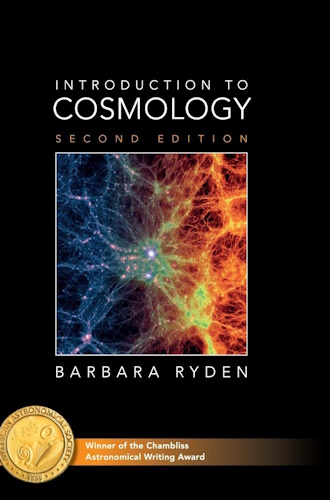

This second edition of Introduction to Cosmology is an exciting update of an award-winning textbook. It is aimed primarily at advanced undergraduate students in physics and astronomy, but is also useful as a supplementary text at higher levels. It explains modern cosmological concepts, such as dark energy, in the context of the Big Bang theory. Its clear, lucid writing style, with a wealth of useful everyday analogies, makes it exceptionally engaging. Emphasis is placed on the links between theoretical concepts of cosmology and the observable properties of the universe, building deeper physical insights in the reader. The second edition includes recent observational results, fuller descriptions of special and general relativity, expanded discussions of dark energy, and a new chapter on baryonic matter that makes up stars and galaxies. It is an ideal textbook for the era of precision cosmology in the accelerating universe.
Hardcover: 276 pages
Publisher: Cambridge University Press; 2 edition (November 24, 2016)
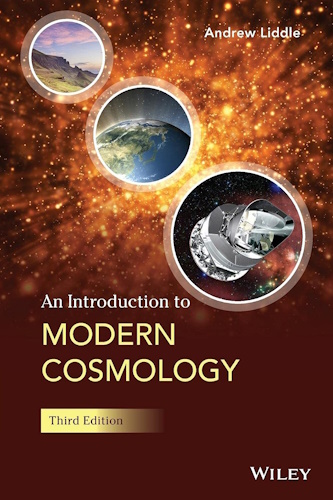

An Introduction to Modern Cosmology

An Introduction to Modern Cosmology Third Edition is an accessible account of modern cosmological ideas. The Big Bang Cosmology is explored, looking at its observational successes in explaining the expansion of the Universe, the existence and properties of the cosmic microwave background, and the origin of light elements in the universe. Properties of the very early Universe are also covered, including the motivation for a rapid period of expansion known as cosmological inflation. The third edition brings this established undergraduate textbook up-to-date with the rapidly evolving observational situation.
This fully revised edition of a bestseller takes an approach which is grounded in physics with a logical flow of chapters leading the reader from basic ideas of the expansion described by the Friedman equations to some of the more advanced ideas about the early universe. It also incorporates up-to-date results from the Planck mission, which imaged the anisotropies of the Cosmic Microwave Background radiation over the whole sky. The Advanced Topic sections present subjects with more detailed mathematical approaches to give greater depth to discussions. Student problems with hints for solving them and numerical answers are embedded in the chapters to facilitate the reader’s understanding and learning.
Cosmology is now part of the core in many degree programs. This current, clear and concise introductory text is relevant to a wide range of astronomy programs worldwide and is essential reading for undergraduates and Masters students, as well as anyone starting research in cosmology. Supplementary material, including full-colour images, updates and links for students and instructors, is available on the author’s website: https://www.roe.ac.uk/~arl/.
Paperback: 198 pages
Publisher: Wiley; 3 edition (July 7, 2015)
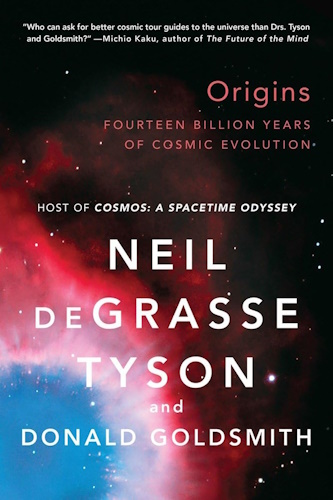

Origins: Fourteen Billion Years of Cosmic Evolution

“Who can ask for better cosmic tour guides to the universe than Drs. Tyson and Goldsmith?” ―Michio Kaku, author of Hyperspace and Parallel Worlds
Our true origins are not just human, or even terrestrial, but in fact cosmic. Drawing on recent scientific breakthroughs and the current cross-pollination among geology, biology, astrophysics, and cosmology, ?Origins? explains the soul-stirring leaps in our understanding of the cosmos. From the first image of a galaxy birth to Spirit Rover's exploration of Mars, to the discovery of water on one of Jupiter's moons, coauthors Neil deGrasse Tyson and Donald Goldsmith conduct a galvanizing tour of the cosmos with clarity and exuberance. 32 pages of color illustrations
About the Author
Neil deGrasse Tyson is an astrophysicist with the American Museum of Natural History, director of its world-famous Hayden Planetarium, host of the hit radio and TV show StarTalk, and the New York Times best-selling author of Astrophysics for People in a Hurry. He lives in New York City.
Paperback: 352 pages
Publisher: W. W. Norton & Company; 1 edition (September 2, 2014)
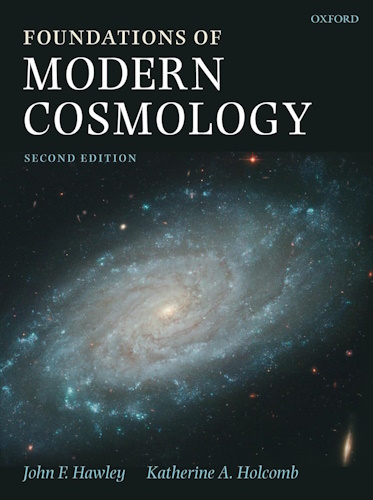

Foundations of Modern Cosmology

Recent discoveries in astronomy, especially those made with data collected by satellites such as the Hubble Space Telescope and the Wilkinson Microwave Anisotropy Probe, have revolutionized the science of cosmology. These new observations offer the possibility that some long-standing mysteries in cosmology might be answered, including such fundamental questions as the ultimate fate of the universe. descriptive introduction to the physical basis for modern cosmological theory, from the big bang to a distant future dominated by dark energy. This second edition includes the latest observational results and provides the detailed background material necessary to understand their implications, with a focus on the specific model supported by these observations, the concordance model. Consistent with the book's title, basics concepts of physics that underlie modern theories of relativity and cosmology; the importance of data and observations is stressed throughout. The book sketches the historical background of cosmology, and provides a review of special and general relativity are treated, before proceeding to an in-depth discussion of the big bang theory and physics of the early universe. The book includes current research areas, including dark matter and structure formation, dark energy, the inflationary universe, and quantum cosmology. The authors' website (http: //www astro.virginia.edu/ jh8h/Foundations) offers a wealth of supplemental information, including discoveries
About the Author
John F. Hawley is Professor of Astronomy at the University of Virginia. His research interests include black holes, accretion disks, and large-scale numerical modeling of astrophysical systems. He was the 1993 recipient of the Helen B. Warner Prize from the American Astronomical Society for his contributions to accretion disk theory and numerical simulations. He has taught an introductory course in cosmology for undergraduates at the University of Virginia since 1989.
Katherine A. Holcomb received a Ph.D. in physics from the University of Texas at Austin. She has worked on numerical simulations of a variety of physical systems, including cosmology, relativistic plasma theory, and climate. She is currently employed at the University of Virginia in research computing support.
Hardcover: 568 pages
Publisher: Oxford University Press; 2 edition (August 25, 2005)
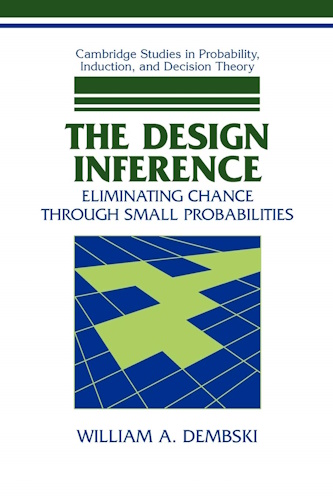

The Design Inference: Eliminating Chance through Small Probabilities

How can we identify events due to intelligent causes and distinguish them from events due to undirected natural causes? If we lack a causal theory how can we determine whether an intelligent cause acted? This book presents a reliable method for detecting intelligent causes: the design inference. The design inference uncovers intelligent causes by isolating the key trademark of intelligent causes: specified events of small probability. Design inferences can be found in a range of scientific pursuits from forensic science to research into the origins of life to the search for extraterrestrial intelligence. This challenging and provocative book will be read with particular interest by philosophers of science and religion, other philosophers concerned with epistemology and logic, probability and complexity theorists, and statisticians.
Series: Cambridge Studies in Probability, Induction and Decision Theory
Paperback: 264 pages
Publisher: Cambridge University Press (January 9, 2006)
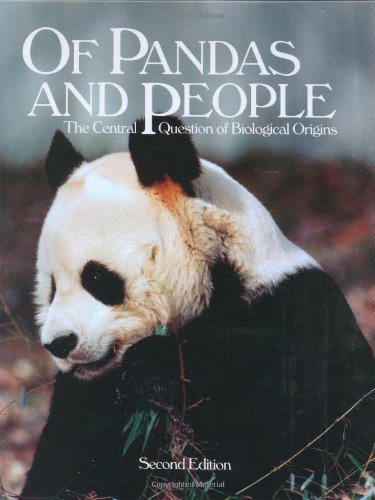

Of Pandas and People: The Central Question of Biological Origins

Of Pandas and People gives evidence for intelligent design from origin-of-life studies, biochemistry, genetics, homology, and paleontology. In a unique manner, Of Pandas and People gives the pros and cons of both the biological-evolution theory and the intelligent-design concept. Pandas promotes a widely recognized goal of science education by fostering a questioning, skeptical and scrutinizing mindset. This supplemental biology textbook provides an extensive index, glossary, references, and suggested reading and resources to help familarize the reader with the material. Pandas is enhanched by the use of numerous diagrams, charts, illustrations and full-color pictures.
About the Author
Percival Davis--Co-Author. Professor of Life Science, Hillsborough Community college, Tampa, Florida, since 1968; author of several college level biology texts, including Biology with Caude Villee and Eldra Solomon (W.B. Saunders, 1985); B.A. in zoology from DePauw University; M.A. in zoology from Columbia University; 60 credit hours beyond the Master's degree at Columbia University and the University of south Florida in zoology, ecology and physiology.
Dean H. Kenyon--Co-Author. Professor of Biology, San Francisco State University, San Francisco, California; contributing author to festschrifts of A.I. Oparin and Sidney Fox; coauthor of Biochemical Predestination (McGraw-Hill, 1969), which was the best-selling advanced level book on chemical evolution in the 1970s; S.B. in physics, 1961 from the University of Chicago; Ph.D. in biophysics, 1965 from Stanford University; National Science Foundation Postdoctoral Fellow 1965-1966 at the University of California, Berkeley; visiting scholar in 1974 to Trinity College, Oxford University; Associate, chemical Evolution Branch, NASA-Ames Research Center in California, 1974-1976; Phi Beta Kappa.
TABLE OF CONTENTS:
- Introduction Of Pandas and People: An Overview Excursion
- Chapter One: The Origin of Life Excursion
- Chapter Two: Genetics and Macroevolution Excursion
- Chapter Three: The Origin of Species Excursion
- Chapter Four: The Fossil Record Excursion Chapter
- Five: Homology Excursion
- Chapter Six: Biochemical Similarities
Textbook Binding: 170 pages
Publisher: Haughton Pub Co; 2 edition (September 1993)
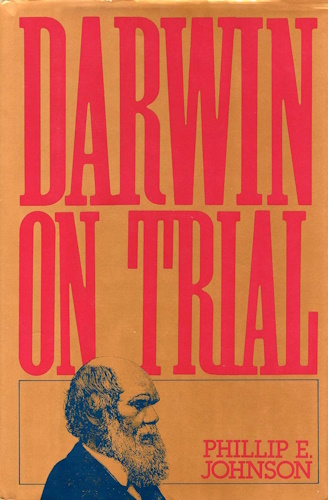

In 2006, Christianity Today voted this title to be one of the top 50 books that have shaped evangelicals! A Christianity Today 1992 Book of the Year Runner-up! Recipient of a Christianity Today 1992 Readers' Choice Award! Here's the book that has rocked the scientific--and Christian--establishment. Phillip Johnson's critique of Darwinian evolution touched off explosions among scientists and theologians almost from the day of its publication in 1992. The volatile debate was at first carried on in academic journals and in magazines like Nature and Scientific American. It even engaged the attention of leading evolutionists like Nobel Laureate physicist Steven Weinberg and prominent naturalist Stephen Jay Gould. Johnson was invited to debate several of his opponents at universities across the country. And he was himself the subject of debate: Michael Ruse, author of Darwinism Defended, spoke at an annual meeting of the American Association for the Advancement of Science on the topic "Nonliteralist Anti-Evolutionism: The Case of Phillip Johnson." Darwin on Trial also shook up theistic evolutionists. William Hasker (Huntington College, Indiana) in the Christian Scholar's Review, Howard Van Till (Calvin College, Michigan) in First Things and Owen Gingerich (Harvard Center for Astrophysics) in Perspectives on Science & the Christian Faith all published their critiques of Darwin on Trial. Clearly, Johnson's arguments have been taken seriously by Darwinists of every sort. And though at first the mainstream press seemed to be out of earshot (except for reviews in Publisher's Weekly and The National Review), news of Darwin on Trial eventually reached wider audiences. Last summer, Johnson appeared with William F. Buckley on Firing Line. And in May 1995 he was interviewed on the PBS telecast In the Beginning: The Creationist Controversy with Randall Balmer. These and other indications of expanding interest in his critique is good news for all who wish to bring the debate over Darwinism into the bright light of day.
Paperback: 220 pages
Publisher: IVP Books; 2 edition (December 3, 1993)
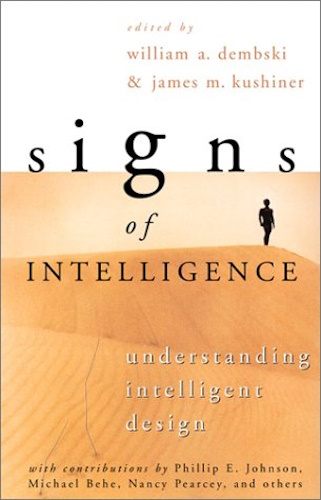

Signs of Intelligence: Understanding Intelligent Design

From Publishers Weekly
Citing inspiration from Quintilian's maxim, "Write not so that you can be understood but so that you cannot be misunderstood," Dembski and Kushiner have assembled a collection of judicious and eloquent essays representing the often-misunderstood intelligent design movement. Contributors include prominent Darwin-doubters Phillip Johnson, Michael Behe and Stephen Meyer, together with a stable of scientists and philosophers associated with the Discovery Institute's Center for the Renewal of Science and Culture, which Meyer directs. Part I of the collection focuses on introducing intelligent design concepts and addressing general philosophical objections; Part II (composing about two-thirds of the book) includes more technical issues and examples of how design comes into play in scientific subfields such as cosmology, developmental biology and information theory. This collection reflects a maturing movement that is aware of its critics, more focused in its goals and mindful of the need to communicate its message to a nonspecialist audience even as it appeals for a hearing in the scientific community. Although Brazos is promoting the book within "science and faith" and "apologetics" categories, these essays promote intelligent design as a scientific research program rather than as a religious doctrine, and only a few call attention to the theological implications or underpinnings of design. Religious issues are actually de-emphasized by most of the contributors, who express frustration at being dismissed as "creationists" by critics in the scientific community. (Mar.) Copyright 2001 Reed Business Information, Inc.
About the Author
William Dembski is a mathematician and philosopher, as well as editor of Mere Creation and author of The Design Inference. James Kushiner is editor of Touchstone magazine.
Paperback: 224 pages
Publisher: Brazos Press; 1St Edition edition (March 1, 2001)
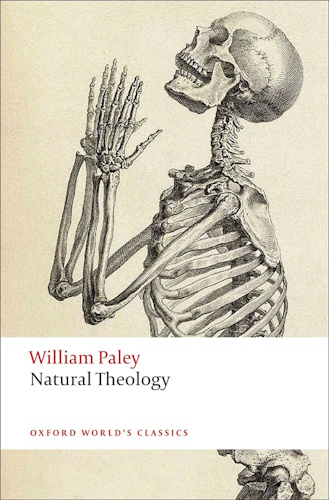

Natural Theology (Oxford World's Classics)

In Natural Theology, William Paley set out to prove the existence of God from the evidence of the beauty and order of the natural world. Famously beginning by comparing the world to a watch, whose design is self-evident, he goes on to provide examples from biology, anatomy, and astronomy in order to demonstrate the intricacy and ingenuity of design that could only come from a wise and benevolent deity. This new edition, which coincides with the bicentennial of Paley's death, reprints the original text of 1802, which was very influential in its day, and still controversial in ours as we see a resurgence in the debate between"intelligent design" and "creationism." The introduction explains how the book built on the early modern natural theology tradition and why it was so influential. The book also contains two appendixes on Paley's courses, an extended bibliography, and full notes offering further background on the key figures of the day. About the Series: For over 100 years Oxford World's Classics has made available the broadest spectrum of literature from around the globe. Each affordable volume reflects Oxford's commitment to scholarship, providing the most accurate text plus a wealth of other valuable features, including expert introductions by leading authorities, voluminous notes to clarify the text, up-to-date bibliographies for further study, and much more.
About the Author
Matthew D. Eddy is a graduate of Princeton Theological Seminary and the University of Durham and has recently held fellowships at the Dibner Institute (MIT), Harvard University, the Max Planck Institute for the History of Science (Berlin) and the University of Notre Dame's Erasmus Institute. He has just finished editing (with David M. Knight) Science and Beliefs: From Natural Philosophy to Natural Science, 1700-1900 (Ashgate,2005). David Knight has edited the British Journal for the History of Science and served as President of the British Society for the History of Science. In 2003 he received the American Chemical Society's Edelstein Award for History of Chemistry.
Series: Oxford World's Classics
Paperback: 384 pages
Publisher: Oxford University Press; Reprint edition (May 15, 2008)
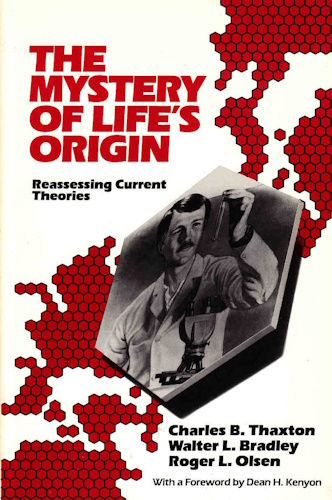

The Mystery of LIfe's Origin: Reassessing Current Theories

Contents: 1) Crisis in the Chemistry of Origins. 2) The Theory of Biochemical Evolution. 3) Simulation of Prebiotic Monomer Synthesis. 4) The Myth of the Prebiotic Soup. 5) Reassessing the Early Earth and Its Atmosphere. 6) Plausibility and Investigator Interference. 7) Thermodynamics of Living Systems. 8) Thermodynamics and the Origin of Life. 9) Specifying How Work Is to Be Done. 10) Protocells. 11) Summary and Conclusion.
Paperback: 228 pages
Publisher: Lewis and Stanley; 2nd Print edition (1992)
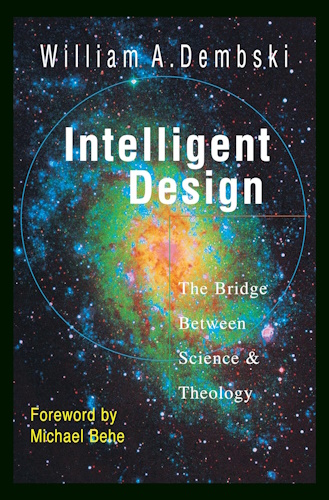

Intelligent Design: The Bridge Between Science & Theology

Voted a 2000 Book of the Year by Christianity Today!
The Intelligent Design movement is three things:
- a scientific research program for investigating intelligent causes
- an intellectual movement that challenges naturalistic evolutionary theories
- a way of understanding divine action
Although the fast-growing movement has gained considerable grassroots support, many scientists and theologians remain skeptical about its merits. Scientists worry that it's bad science (merely creationism in disguise) and theologians worry that it's bad theology (misunderstanding divine action). In this book William Dembski addresses these concerns and brilliantly argues that intelligent design provides a crucial link between science and theology. Various chapters creatively and powerfully address intelligent discernment of divine action in nature, why the significane of miracles should be reconsidered, and the demise and unanswered questions of British natural theology. Effectively challenging the hegemony of naturalism and reinstating design within science, Dembski shows how intelligent design can be unpacked as a theory of information. Intelligent Design is a pivotal, synthesizing work from a thinker whom Phillip Johnson calls "one of the most important of the design theorists who are sparking a scientific revolution by legitimating the concept of intelligent design in science."
About the Author
William Dembski (Ph.D., mathematics, University of Chicago; Ph.D., philosophy, University of Illinois at Chicago) is senior fellow of the Discovery Institute's Center for Science and Culture. He has previously taught at Northwestern University, the University of Notre Dame, and the University of Dallas. He has done postdoctoral work in mathematics at MIT, in physics at the University of Chicago, and in computer science at Princeton University, and he has been a National Science Foundation doctoral and postdoctoral fellow. Dembski has written numerous scholarly articles and is the author of the critically acclaimed The Design Inference (Cambridge), Intelligent Design (InterVarsity Press) and No Free Lunch: Why Specified Complexity Cannot Be Purchased without Intelligence (Rowman and Littlefield).
Paperback: 312 pages
Publisher: IVP Academic (August 12, 2002)
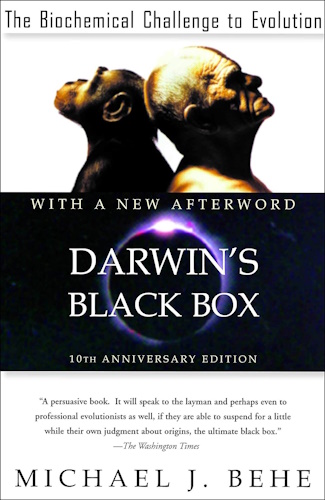

Darwin's Black Box: The Biochemical Challenge to Evolution

Darwin’s Black Box helped to launch the Intelligent Design movement: the argument that nature exhibits evidence of design, beyond Darwinian randomness. Today, with the movement stronger than ever, Michael J. Behe updates the book with an important new Afterword on the state of the debate. —Time
Naming Darwin’s Black Box to the National Review’s list of the 100 most important nonfiction works of the twentieth century, George Gilder wrote that it “overthrows Darwin at the end of the twentieth century in the same way that quantum theory overthrew Newton at the beginning.” Discussing the book in The New Yorker in May 2005, H. Allen Orr said of Behe, “he is the most prominent of the small circle of scientists working on intelligent design, and his arguments are by far the best known.” From one end of the spectrum to the other, Darwin’s Black Box has established itself as the key text in the Intelligent Design movement—the one argument that must be addressed in order to determine whether Darwinian evolution is sufficient to explain life as we know it, or not.
For this edition, Behe has written a major new Afterword tracing the state of the debate in the decade since it began. It is his first major new statement on the subject and will be welcomed by the thousands who wish to continue this intense debate.
About the Author
Michael J. Behe is a Professor of Biological Science at Lehigh University, where he has worked since 1985. From 1978 to 1982 he did postdoctoral work on DNA structure at the National Institutes of Health. From 1982 to 1985 he was Assistant Professor of Chemistry at Queens College in New York City. He has authored more than forty technical papers, but he is best known as the author of Darwin's Black Box: The Biochemical Challenge to Evolution. He lives near Bethlehem, Pennsylvania, with his wife and nine children.
Paperback: 352 pages
Publisher: Free Press; 2nd edition (March 13, 2006)
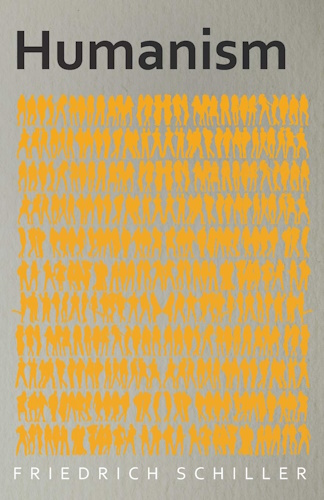

This volume contains a collection of fascinating essays written by the German-British philosopher, Scott Schiller. This wonderful collection is highly recommended for those with a keen interest in early-twentieth century philosophy, and it is not to be missed by fans and collectors of Schiller’s work. The essays contained herein include: “The Ethical Basis of Metaphysics”, “Useless Knowledge”, “Truth”, “Lotze’s Monism”, “The Metaphysics of the Time-Process”, “Reality and Idealism”, “Darwinism and Design”, “Concerning Mephistopheles”, “On Preserving Appearances”, etcetera. Ferdinand Canning Scott Schiller (1864 - 1937) was a German-British philosopher whose work is often aligned with the pragmatism of William James. We are republishing this vintage text now in an affordable, modern edition - complete with a specially commissioned new biography of the author.
Paperback: 326 pages
Publisher: Cope Press (July 22, 2015)
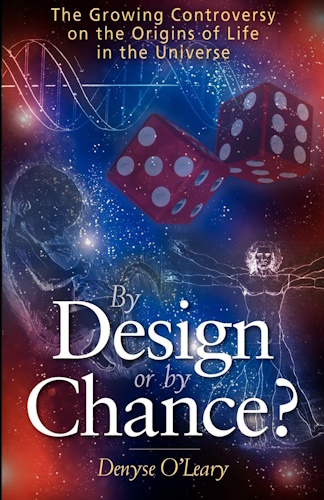

By Design Or By Chance?: The Growing Controversy On The Origins Of Life In The Universe

O'Leary provides by far the broadast overview yet of the ID movement. she quotes ID leaders such as Phillip Johnson, William Dembski and Michael Behe. she also quotes their sternest critics, including Richard Dawkins, Stephen J. Gould and Michael Ruse. She writes about the Wedge movement, DNA, the age of the Earth, the search for extraterrestrial life, the teaching of ID in schools, and the monarch butterfly. She anticipates the culmination of the ID revolution by writing that Darwinism "was part of our folklore." Yet the evolutionary tales she relates are still widely taught as fact in many schools. This well organized guidebook of O'Leary's journey through the world of Intelligent Design has the potential to lead many of the next generation away from the evolutionary fables that now pass for science. Her book is must reading for anyone who wants to understand the history and significance of the Intelligent Design movement. It also belongs in college and even high school classrooms. Forrest M. Mims III, U.S. science journalist Denyse O'Leary has been a freelance writer since 1971. She specializes in science news of interest to faith communities for such publications as Christianity Today, Faith Today, and the Christian Times. She is the author of several titles including Faith@Science: Why Science Needs Faith in the Twenty-First Century, and it the Faith and Science columnist for ChristianWeek. She has written for newspapers, magazines, book publishers, and trade jounals, including the Globe & Mail, the Toronto Star, and Canadian Living.
About the Author
Denyse O'Leary is a journalist who writes on topics related to science, religion, and faith. She is the author of several titles including Faith and Science: Why Science Needs Faith in the TwentyFirst Century. The faith and science columnist for ChristianWeek, O'Leary has also contributed articles for Christianity Today, Faith Today, and Christian Times.
Paperback: 352 pages
Publisher: Castle Quay; First Edition (US) First Printing edition (June 9, 2004)
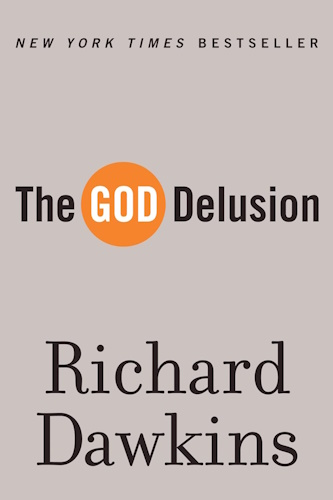

A preeminent scientist -- and the world's most prominent atheist -- asserts the irrationality of belief in God and the grievous harm religion has inflicted on society, from the Crusades to 9/11.
With rigor and wit, Dawkins examines God in all his forms, from the sex-obsessed tyrant of the Old Testament to the more benign (but still illogical) Celestial Watchmaker favored by some Enlightenment thinkers. He eviscerates the major arguments for religion and demonstrates the supreme improbability of a supreme being. He shows how religion fuels war, foments bigotry, and abuses children, buttressing his points with historical and contemporary evidence. The God Delusion makes a compelling case that belief in God is not just wrong but potentially deadly. It also offers exhilarating insight into the advantages of atheism to the individual and society, not the least of which is a clearer, truer appreciation of the universe's wonders than any faith could ever muster.
About the Author
RICHARD DAWKINS taught zoology at the University of California at Berkeley and at Oxford University and is now the Charles Simonyi Professor of the Public Understanding of Science at Oxford, a position he has held since 1995. Among his previous books are The Ancestor’s Tale, The Selfish Gene, The Blind Watchmaker, Climbing Mount Improbable, Unweaving the Rainbow, and A Devil’s Chaplain. Dawkins lives in Oxford with his wife, the actress and artist Lalla Ward.
Paperback: 464 pages
Publisher: Mariner Books; Reprint edition (January 16, 2008)
![]()
![]()